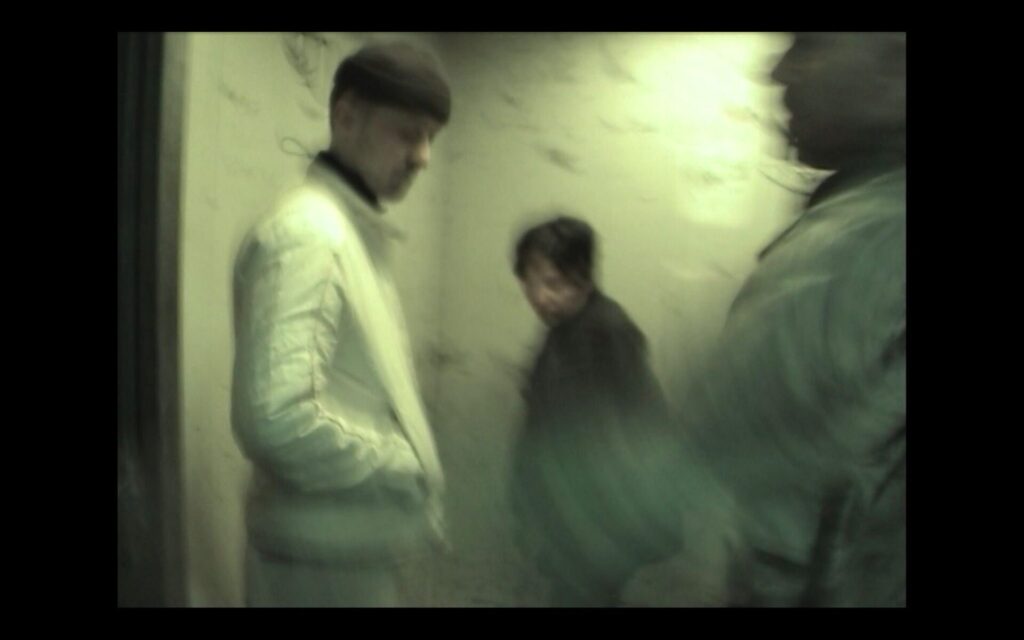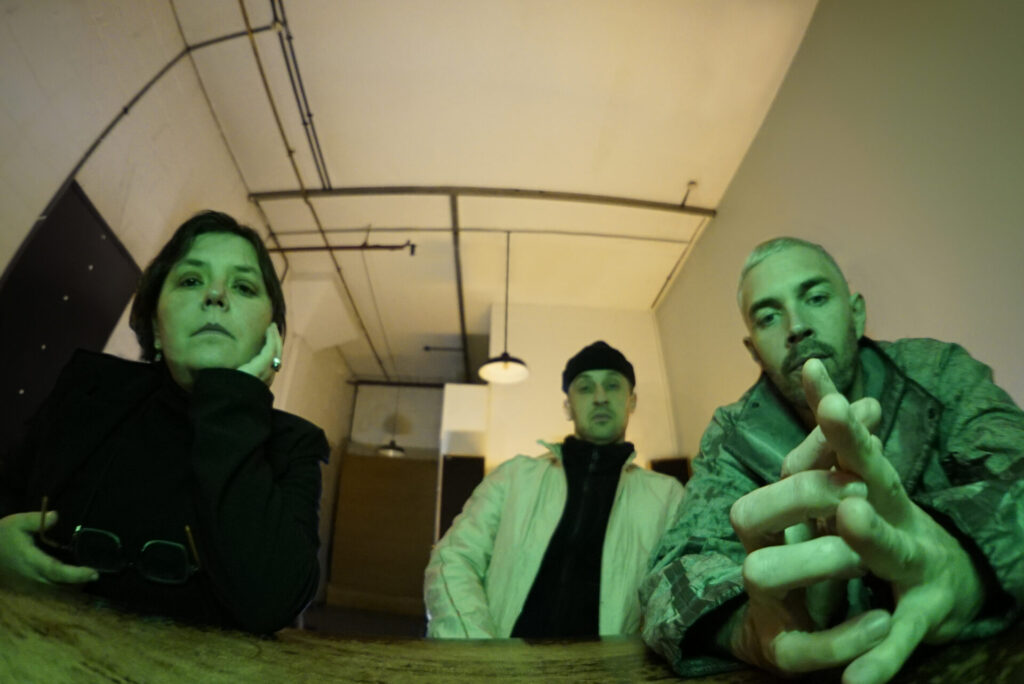“I just wanna say I really appreciate this ‘cause nobody ever asks to use my voice for a track.”
These are the words we hear at the start of ‘Lift You’, by Moin. We often hear voices on their tracks. Frequently, they’re obscured, chopped up, usually excavated from an unclear origin – and Moin like to keep it uncertain. This voice is different though. It’s likely home-recorded – room tone sits thick behind the speaker – but this time it’s clear and precise. And we know who owns it too – artist and writer Sophia Al-Maria – because it was Moin who asked her to record the poem these words precede.
The next sound we hear on ‘Lift You’ is the drums – the steady, crisp percussion of Valentina Magaletti, before her Moin bandmates Joe Andrews and Tom Halstead add fairly unadorned, softly strummed guitar and the descending tone of a slide whistle, or at least a sample that bears a passing resemblance to one. The song is constructed from building blocks, and Moin want you to hear that, to feel the stitches. The voice here is human, and they want you to hear that too.
“It was about opening up, the allure of a new avenue we hadn’t gone down before,” says Andrews of this break from the band’s trademark sampling approach to vocals – something “closer to the DNA of dance music and jungle”, they explain – by welcoming guest performers on their third record You Never End. “There was no real direction. We just wanted to let go and see what happened. It’s important for us to feel like the guests were given the right respect and space to deliver their performance but, when a contribution came in, also to try to work with it in a way that still fits in with us.”
What Andrews is referring to is the Moin way – a cut up, collagist approach to songcraft, and an unconventional musical philosophy.
“We try to find stuff that means something but doesn’t, feels like it’s impactful but also abstract, and we’re always using that to be provocative, to deliver emotion or resonance but also not committing to it,” says Halstead about how they’ve approached sampling in the past. “Editing these voices [on You Never End] was a learning curve, because it’s a personal instrument. You have to be delicate in how you cut up or rearrange or omit parts.” Al-Maria’s reading on ‘Lift You’ could be used to illustrate their process: “To read in a time of war. To read it again. To think about it. To read it aloud. To record it. Try again. To listen back. To send and unsend.”
Moin is a resurrection of an offshoot. Andrews and Halstead had already garnered significant praise with their austere electronic project Raime when they bumped into Magaletti at a party.
“I was playing, and we had a friend in common who introduced us,” remembers Magaletti hazily, also a part of various other outfits including Tomaga and Vanishing Twin. “That was like 15 years ago – it was crazy long ago.”
Moin’s work can cast them as somewhat shadowy, but all three are open and thoughtful in conversation together. “Were you playing with [psych band] The Oscillation then?” asks Halstead. “I can’t remember, but I thought, ‘she’s a really good drummer, must bear that in mind’.”
Raime had experimented with genre via its own sampling process, and Moin began as a guitar-centric excuse for Andrews and Halstead to linger in what they were discovering through early goth, post punk, industrial, and the avant-garde fringes. As Moin, the duo collected some stray recordings and released an EP, before Magaletti joined them to incorporate live instrumentals with Raime on the album Quarter Turns Over A Living Line. “It was very depressing music – I really loved it,” says Magaletti.
“We weren’t used to working with live musicians, so we went to the studio and learned more about how to interact and how to try and convey what we were looking to do,” says Halstead. “Valentina’s playing allowed us to see different possibilities. I always feel like the nicest time to mess around with stuff is when you don’t feel like you’re a master of it. We hadn’t been in bands forever and knew what we were doing to a certain degree, but it was a form of experimentation.”
Magaletti agrees: “What you just described is exactly the reason I do this – I want to always be surprised and be humble about what music I can make. Otherwise it would be so sterile. To know what you are and the completion of it all before you complete the journey is of no interest of me. It’s not about technique, it’s the magic of it.”
The trio recalibrated nearly a decade later as Moin again. “This second phase, which is obviously more substantial, was us not being able to face doing another Raime record,” says Andrews. “We were in a cul-de-sac, feeling a bit stuck. We needed to find a way of rediscovering creative fluidity, rediscovering a kind of speed and joy, and investigating the project again felt like the most fun and interesting thing to do.”
They released Moot!, the debut album where they crystallised their idiosyncratic methods, in 2021..It was a sound with a heritage, descended from post-hardcore and Dischord Records and Slint and Black Flag and Fugazi, and the ways those bands could shred but also swing when they really wanted to. But throwing in the indeterminate samples, and the way Andrews and Halstead would take recordings of Magaletti’s live drums and snip and reattach and shape them, it was also a strange and refreshing brew. Paste followed in 2022, and the Clocked Off EP a year later. Moin worked fast, drilling down and refining their sonic identity.
The invited voices of You Never End are a significant system update, nowhere clearer than on thrillingly direct opener ‘Guess It’s Wrecked’, where Irish musician Olan Monk provides the most conventional verse-chorus a Moin song has yet included. Andrews and Halstead would string together “mixtapes” of the countless demos the album recording sessions produced and send them to their collaborators to see what stuck with them.
There are more familiar pleasures too, such as the propulsive ‘It’s Messy Coping’, applying dance music instincts to post-hardcore guitars, with a clashing and churned up snippet of found sound, and Magaletti’s drums high and loud in the mix. This, Andrews says, is the essence of Moin. “Valentina’s playing inspires the way rhythm is treated within the music itself.”

But elsewhere, Coby Sey and James K further reconfigure Moin’s music with live voices. “It’s always been the goal with this project to try and find a relationship between liveness and the studio, and the editing process is about finding that balance,” says Andrews. “No matter what elements we’re using, they shouldn’t seem incongruous. They should feel like they live in it.”
Using the common language of music criticism to describe Moin’s sound can be a conundrum, as it is as attached to its lineage as it is attempting to float outside of familiar genre signifiers – one writer landed on “post-whatever”, perhaps wisely dismissing the challenge. Slipperiness is a key aspect, and they are reticent to draw out clearly delineated parameters. “I am personally uncomfortable with any of this. Is it too ambitious to just be labelled as ‘music’?” replies Magaletti when I ask if they see themselves as a ‘rock band’.
“You never want to be restricted to one particular place. You want suggestiveness and nuance, not taking yourself too seriously and leaving room for interpretation,” adds Halstead.
“It’s hard to say the Moin project is not guitar-orientated,” says Andrews. “And it means you get to play with all sorts of influences you might not get to in other areas, but it’s a jumping off point to play around the edges. Whatever genre you end up articulating, it always feels a bit wrong.
“We get it a lot actually when referring to our music. I’m not resentful of it because it’s nice just to be talked about. There are these codes we use to communicate with. If it is surmised as nostalgia then, as people making music in the now, that doesn’t feel completely right. And you know, every piece of music is subject to, and a result of, its previous lineage of creative pathways. Of course, there is lots of music that we resonate with – and love – woven into our creative practice. And I’m proud of that, rather than being scared of it or rejecting it.”
Whatever Moin are perceived to be – rock band, side project, editors – they are deconstructing it, and putting it back together piece by piece in their own image.
Moin’s new album You Never End is released on 25 October by AD93



